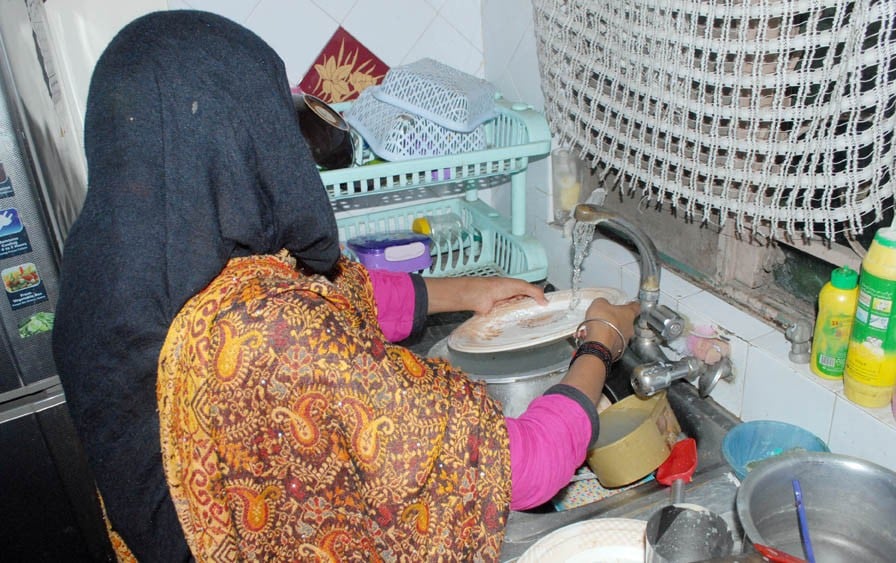
We all fall in the ambit of ‘employers’ of domestic workers. To change and improve the way our domestic workers are treated, we have to first change ourselves

Long working hours, heavy workload, violence, abuse and humiliation at their workplace, low wages, absence of legislation, lack of labour inspection and poor living conditions; domestic workers are an undervalued and disadvantaged workforce in Pakistan, vulnerable to all kinds of discrimination.
Around 8.5 million domestic workers in Pakistan should have their rights recognised -- most of them are women and a large number are young children. This is the second largest subsector of informal economy uncovered under labour laws and yet they are exploited.
There are two kinds of domestic workers in the country, one working as part-time workers and other living at their employers’ residence. The latter kind of workers is akin to modern day slavery where they are forced to start working early in the morning and then later into the night.
The International Labour Organization (ILO) Convention C189 "Convention on Domestic Workers" adopted at the 100th ILO Annual Conference at Geneva to bring an estimated of 100 million domestic workers (83 per cent of these workers are women or girls and many are migrant workers) worldwide under the realm of labour standards.
ILO standards set out that domestic workers around the world must have the same basic labour rights as those available to other workers, including reasonable working hours, annual leave, daily and weekly rest periods, limits on in-kind payment, and clear information on terms and conditions of employment. The freedom of association, the right to collective bargaining, and protection against all forms of abuse, harassment and violence were also discussed at the convention.
Pakistan has yet not signed the ILO Convention C189, nor can it afford to do so both in context of giving domestic workers their fair status or other amenities that the convention covers.
Similarly, the employers of these workers, the major partner of this tripartite (government, employers and employees) will never let domestic workers enjoy the ‘luxuries’ mentioned above and covered in the proposed policy on domestic workers framed by the Punjab government and approved by the provincial cabinet in 2015; these policies are still in the legislation pipeline.
If domestic workers are given the status of ‘workers’ then they are supposed to receive many facilities including minimum wage to be given to an unskilled worker along with the social security benefits and so on. Will employers of domestic workers accept this? It is unlikely. Employers of domestic workers can be identified in almost all rich communities and big cities. In fact, they are from amongst us, as most of us have domestic workers at our homes to take care of our children and kitchens.
The Punjab government has recently launched a pilot training programme for domestic workers to improve the standards of their work and working conditions. This also includes awareness regarding their legal rights, basic functional literacy and calculations, live skills and ethics, maintenance of hygiene and sanitation, and safety precautions. Skills such as housekeeping, child care, cooking, event management and caring for elderly people are also included in the training programmes.
Efforts by the government and non-governmental organisations to improve working conditions for domestic workers are commendable yet these are addressed to the domestic workers exclusively. The employers of this workforce have not been included in any of initiatives taken for domestic workers. The issue is that poor and powerless domestic workers have no authority, control and role to play in the betterment of their working conditions or in improving the behaviour of their employers or masters. Further, the employer will likely not allow the workers to attend these training programmes.
Awareness about their legal rights as domestic workers may create frustration and misery since they will not dare to ask for these rights, specially in a society where a female child worker in Islamabad was beaten and her hand burnt on the stove by her ‘employers’ as punishment for losing a broom. Luckily, the child was recovered by the police and a women’s crisis centre in Islamabad.
This is not the only example of its kind, we regularly come across such cases of brutality in child domestic labour -- the brutalities may include injures, burning, cutting long hair and brutally tortured and sexually abused. And there are many more incidences which have never been reported.
In such a situation there is a need to instruct employers of domestic workers about basic labour rights, reasonable working hours, annual leave, daily and weekly rest periods, clear information on terms and conditions of employment, freedom of association, the right to collective bargaining, and protection against all forms of abuse, harassment and violence against domestic workers as included in ILO Convention and covered under proposed policy of domestic workers.
Socioeconomic factors such as poverty and a lack of job opportunities for this poverty stricken and illiterate section of the society compels them to stay silent about such issues. Many efforts have been made by various NGOs and development organisations to promote these issues and launch advocacy campaigns for policy formulation.
Domestic workers have also formed unions in Islamabad by the name of HomeNet Pakistan, an NGO supporting home-based workers and domestic workers in Pakistan. Domestic workers will not receive their rights until their employers, the custodian of these rights, are involved.
We all fall in the ambit of ‘employers’ of domestic workers. To change and improve the way our domestic workers are treated, we have to first change ourselves.